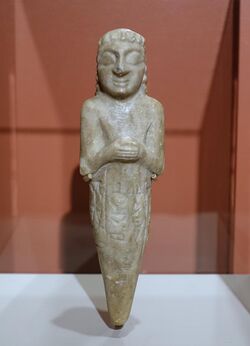Religion:Shul-utula

Shul-utul (Sumerian: 𒀭𒂄𒀖𒇻, Dšul-utul₁₀)[1] or Shul-utula[2] was the personal god of the rulers of the Mesopotamian Ur-Nanshe dynasty of Lagash.[2] His name means "youngling shepherd" in Sumerian.[3]
Despite his role as the personal deity of kings, Shul-utul was not regarded as a deity associated with ruling, and it is possible his role was instead connected to personal luck.[4] It is also possible that, similar to Ninshubur, he was envisioned as capable of mediating with higher ranked gods on behalf of humans under his protection.[4] One document states that he helped kings with building temples in Girsu.[3] He is mentioned in inscriptions in association with rulers such as Entemena and Eannatum.[5]
Shut-utul is mostly attested in association with temples of other deities.[6] Seven foundation figurines from the Ibgal temple, which dedicated to Inanna,[6] are assumed to be depictions of Shul-utul.[7] He was also worshiped in Emah (Sumerian: "exalted house"[8]), a shrine of Nanshe located in Girsu.[9]
The only certain attestation of Shul-utul from the Ur III period is the personal name Ur-Shul-utul.[7] None are known from later periods.[7]
References
- ↑ "Sumerian Dictionary". http://oracc.iaas.upenn.edu/epsd2/cbd/sux/SH.html.
- ↑ 2.0 2.1 Kobayashi 1989, p. 23.
- ↑ 3.0 3.1 Selz 1995, p. 279.
- ↑ 4.0 4.1 Kobayashi 1989, p. 24.
- ↑ Selz 1995, pp. 279–280.
- ↑ 6.0 6.1 Selz 1995, p. 280).
- ↑ 7.0 7.1 7.2 Michalowski 2013, p. 289.
- ↑ George 1993, p. 119.
- ↑ George 1993, p. 120.
Bibliography
- George, Andrew R. (1993). House most high: the temples of ancient Mesopotamia. Winona Lake: Eisenbrauns. ISBN 0-931464-80-3. OCLC 27813103.
- Kobayashi, Toshiko (1989). "Was Mesandu the Personal Deity of Enentarzi?". Orient (The Society for Near Eastern Studies in Japan) 25: 22–42. doi:10.5356/orient1960.25.22. ISSN 1884-1392. https://www.jstage.jst.go.jp/article/orient1960/25/0/25_0_22/_article/-char/en.
- Michalowski, Piotr (2013)
- Selz, Gebhard (1995) (in de). Untersuchungen zur Götterwelt des altsumerischen Stadtstaates von Lagaš. Philadelphia: University of Pennsylvania Museum. ISBN 978-0-924171-00-0. OCLC 33334960. https://www.academia.edu/1564636.
 |
